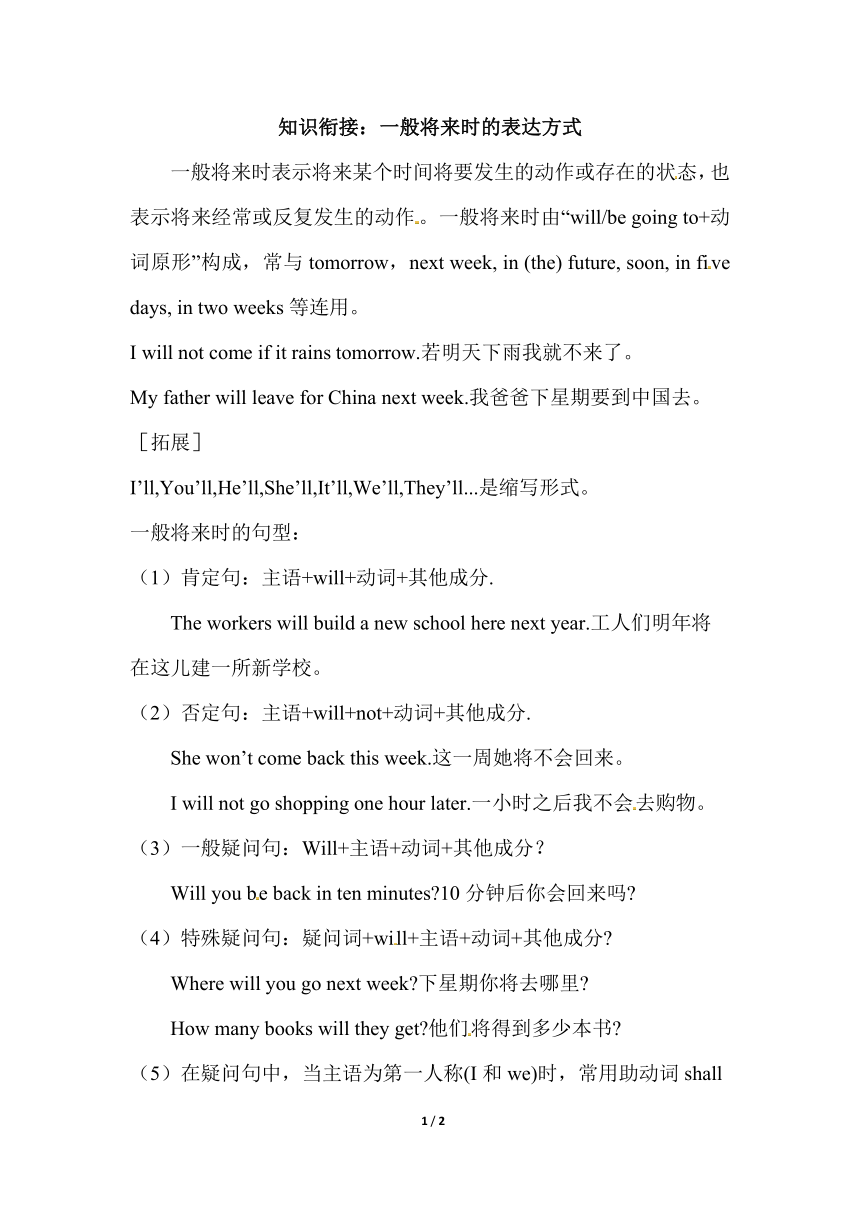外研版七年级英语下册 知识衔接:一般将来时的表达方式
文档属性
| 名称 | 外研版七年级英语下册 知识衔接:一般将来时的表达方式 |  | |
| 格式 | doc | ||
| 文件大小 | 75.0KB | ||
| 资源类型 | 教案 | ||
| 版本资源 | 外研版 | ||
| 科目 | 英语 | ||
| 更新时间 | 2022-06-11 21:41:58 | ||
图片预览

文档简介
知识衔接:一般将来时的表达方式
一般将来时表示将来某个时间将要发生的动作或存在的状态,也表示将来经常或反复发生的动作。一般将来时由“will/be going to+动词原形”构成,常与tomorrow,next week, in (the) future, soon, in five days, in two weeks等连用。
I will not come if it rains tomorrow.若明天下雨我就不来了。
My father will leave for China next week.我爸爸下星期要到中国去。
[拓展]
I’ll,You’ll,He’ll,She’ll,It’ll,We’ll,They’ll...是缩写形式。
一般将来时的句型:
(1)肯定句:主语+will+动词+其他成分.
The workers will build a new school here next year.工人们明年将在这儿建一所新学校。
(2)否定句:主语+will+not+动词+其他成分.
She won’t come back this week.这一周她将不会回来。
I will not go shopping one hour later.一小时之后我不会去购物。
(3)一般疑问句:Will+主语+动词+其他成分?
Will you be back in ten minutes 10分钟后你会回来吗
(4)特殊疑问句:疑问词+will+主语+动词+其他成分
Where will you go next week 下星期你将去哪里
How many books will they get 他们将得到多少本书
(5)在疑问句中,当主语为第一人称(I和we)时,常用助动词shall代替will。
Shall we get something to eat 我们弄点吃的东西怎么样
What shall I do 我该怎么办呢
(6)在书面语中,主语为第一人称(I和we)时,也常用助动词shall,但在口语中,所有人称都可以用will。
We shall go to Shanghai next year.明年我们将去上海。
I shall write to you soon.我会尽快写信给你的。
[辨析]be going to与will的区别
(1)be going to 表示近期、眼下就要发生的事,will表示的将来时间则较远一些。
It’s going to rain. 天要下雨了。
He will be a writer in the future. 他将来会成为一名作家。
(2)be going to 表示根据主观判断将来肯定要发生的事情,will表示客观上将来势必要发生的事情。
He is seriously ill. He is going to die.他病得很重,就要死了。
He will be 18 years old tomorrow.他明天将18岁了。
(3)be going to 含有“计划,准备”的意思,而will则没有这个意思。
She is going to lend us her book.她打算把她的书借给我们。
1 / 2
一般将来时表示将来某个时间将要发生的动作或存在的状态,也表示将来经常或反复发生的动作。一般将来时由“will/be going to+动词原形”构成,常与tomorrow,next week, in (the) future, soon, in five days, in two weeks等连用。
I will not come if it rains tomorrow.若明天下雨我就不来了。
My father will leave for China next week.我爸爸下星期要到中国去。
[拓展]
I’ll,You’ll,He’ll,She’ll,It’ll,We’ll,They’ll...是缩写形式。
一般将来时的句型:
(1)肯定句:主语+will+动词+其他成分.
The workers will build a new school here next year.工人们明年将在这儿建一所新学校。
(2)否定句:主语+will+not+动词+其他成分.
She won’t come back this week.这一周她将不会回来。
I will not go shopping one hour later.一小时之后我不会去购物。
(3)一般疑问句:Will+主语+动词+其他成分?
Will you be back in ten minutes 10分钟后你会回来吗
(4)特殊疑问句:疑问词+will+主语+动词+其他成分
Where will you go next week 下星期你将去哪里
How many books will they get 他们将得到多少本书
(5)在疑问句中,当主语为第一人称(I和we)时,常用助动词shall代替will。
Shall we get something to eat 我们弄点吃的东西怎么样
What shall I do 我该怎么办呢
(6)在书面语中,主语为第一人称(I和we)时,也常用助动词shall,但在口语中,所有人称都可以用will。
We shall go to Shanghai next year.明年我们将去上海。
I shall write to you soon.我会尽快写信给你的。
[辨析]be going to与will的区别
(1)be going to 表示近期、眼下就要发生的事,will表示的将来时间则较远一些。
It’s going to rain. 天要下雨了。
He will be a writer in the future. 他将来会成为一名作家。
(2)be going to 表示根据主观判断将来肯定要发生的事情,will表示客观上将来势必要发生的事情。
He is seriously ill. He is going to die.他病得很重,就要死了。
He will be 18 years old tomorrow.他明天将18岁了。
(3)be going to 含有“计划,准备”的意思,而will则没有这个意思。
She is going to lend us her book.她打算把她的书借给我们。
1 / 2
同课章节目录
- Module 1 Lost and found
- Unit 1 Whose bag is this?
- Unit 2 Are they yours?
- Unit 3 Language in use
- Module 2 What can you do ?
- Unit 1 I can play the piano
- Unit 2 I can run really fast
- Unit 3 Language in use
- Module 3 Making plans
- Unit 1 What are you going to do at the weekends?
- Unit 2 We're going to cheer the players.
- Unit 3 Language in use
- Module 4 Life in the future
- Unit 1 Everyone will study at home
- Unit 2 Every family will have a small plane.
- Unit 3 Language in use
- Module 5 Shopping
- Unit 1 What can I do for you?
- Unit 2 You can buy everything on the Internet
- Unit 3 Language in use
- Module 6 Around town
- Unit 1 Could you tell me how to get to the Nationa
- Unit 2 The London Eye is on your right.
- Unit 3 Language in use
- Revision module A
- Module 7 My past life
- Unit 1 I was born in a small village.
- Unit 2 I was born in Quincy.
- Unit 3 Language in use
- Module 8 Story time
- Unit 1 Once upon a time….
- Unit 2 Goldilocks hurried out of the house.
- Unit 3 Language in use
- Module 9 Life history
- Unit 1 He left school and began work at the age of
- Unit 2 He decided to be an actor.
- Unit 3 Language in use
- Module 10 A holiday journey
- Unit 1 What did you do?
- Unit 2 This morning we took a walk.
- Unit 3 Language in use
- Module 11 Body language
- Unit 1 They touch noses!
- Unit 2 Here are some ways to welcome them.
- Unit 3 Language in use
- Module 12 Western music
- Unit 1 It's so beautiful!
- Unit 2 Vienna is the centre of European classical
- Unit 3 Language in use
- Revision module B
